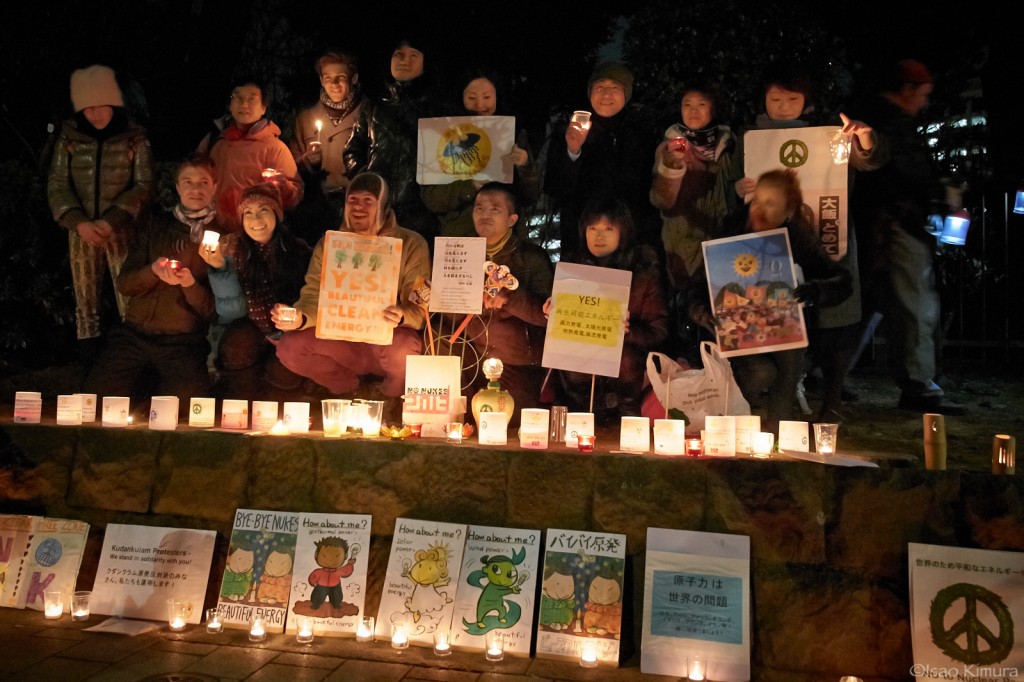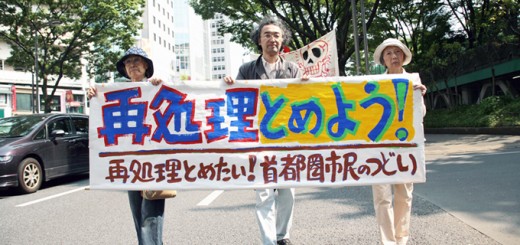by Jacinta Hin, Co-Founder of Beautiful Energy

Photo by Isao Kimura
Beautiful Energy is a movement for peaceful energy born during the early days ―the summer of 2012― of the Friday protest against the restart of nuclear plants in Japan. A group of foreign friends, long-term residents of Japan, who met and bonded at the weekly protests, realized that not being Japanese, they stood out. Sought out by the Japanese press, they often were photographed and interviewed. More importantly, they understood the opportunity: to represent a global voice against nuclear energy and to let protesters know that the world was watching and supporting them. In those days, the Friday protest attracted over 10,000 people each week, many of whom had never attended a demonstration in their life. People were angry and emotional. They felt both isolated from and guilty towards the world about the Fukushima nuclear disaster.
We began to bring more foreign friends to the protest, and bilingual banners expressing our message of global solidarity. Then one day, one of us had the idea to bring candles to symbolize our stand: a positive message for a world that thrives on nuke-free, environmental-friendly energy (solar, wind and geothermal). We agreed and named our new movement Beautiful Energy, settling in a spot near the speech corner in front of the main gate of the Japanese parliament. Here we lighted our first candles one cold and dark Friday evening, October or November 2012. The exact date we have forgotten.
Four years and many Fridays later, we still light our candles every week and at the same place. Our core group has become bigger and is no longer exclusively foreign. Today we are an eclectic mix of nationalities, including Japanese. People of different ages, from student to retiree, homemaker, salarymen and working women. While our positive message and intentions have not changed, our candles have become a platform for how people want to express the reason for their involvement in the nuke-free movement. Thousands of people have passed by our candles. Hundreds of people have written personal messages on shades we put around the candles, which have the extra benefit of protecting them from wind, snow and rain. Every week, people around the world light Beautiful Energy candles from their homes. Every few months, we participate in the larger anti-nuclear demonstrations in Tokyo with our most colorful shades, stapled into one large banner, representing the many Beautiful Energy voices and messages. And every year, on March 11, we organize a global candle chain to commemorate the triple disaster of 3/11/11.
At the Friday protest, our spot has become a fixture and a place to rest and have a chat. During cold winter evenings, people warm their hands above the candles. Elderly people tell us that our candles give them a sense of peace and hope. A small gesture perhaps, but we feel our presence is meaningful; a grain of radiant sand in the global movement for a nuke-free world.
Why candles, you may wonder?
Candles are a universal symbol of life, love, and contemplation. When we light candles together, we feel united and at peace. They also represent light in the darkness of life: in the aftermath of the Fukushima nuclear disaster, we need hope and confidence that, together, we can create a better ―nuke-free― future for our planet. Furthermore, the candle flame, being energy, is a symbol for safe, environmentally friendly and peaceful energy.
Beautiful Energy is open to anyone. We consider ourselves a non-political peace movement of heart-to-heart connection. Regardless of your unique way and language to express your stand for a nuke-free world ―political, humanitarian, societal, spiritual, a mix or otherwise― you are always welcome to light a candle with us. In fact, we encourage you to do so. In person at our spot in front of the Japanese parliament on Friday, between 18.30-20.00. Or remote at your home or elsewhere, wherever you are in the world.


